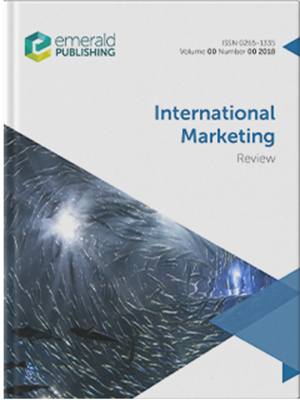Understanding consumers' upward blame attribution, revenge and reconciliation toward multinational versus domestic brand scandals
IF 4.6
3区 管理学
Q1 BUSINESS
引用次数: 0
Abstract
Purpose This study investigated a new attributional phenomenon in a brand scandal setting in which consumers tend to blame the top management of a brand, even though it was the frontline parties that caused the scandal. The authors termed this phenomenon upward blame attribution (UBA), shedding light on whether consumers in a host country indicate a higher UBA for a multinational (vs domestic) brand scandal, which in turn reinforces their revenge and impairs their reconciliation reactions, and whether these effects are contingent on consumer animosity. Design/methodology/approach Two experimental studies were conducted with real and fictitious brand/product and country stimuli with 1,399 Chinese participants. Findings Both studies verified UBA and found that Chinese consumers' UBA is higher for multinational (vs domestic) brand scandals, which drives their stronger desire for revenge and weaker desire for reconciliation. Moreover, consumers with high (vs low) animosity toward a multinational brand's home country reported a higher UBA for the multinational (vs domestic) brand scandal, which in turn reinforces their desire for revenge and impairs their desire for reconciliation. Practical implications The study provides new insights into host-country consumers' more severe UBA and responses toward multinational versus domestic brand scandals and the amplifying role of consumer animosity in these processes. It also has implications for mitigating host-country consumers' UBA and negative responses to multinational brand scandals. Originality/value This study contributes to the blame attribution literature by verifying consumers' UBA and the country-of-origin (COO) literature by revealing host-country consumers' higher UBA, stronger revenge desire and weaker reconcile desire toward multinational (vs domestic) brand scandals. It extends the knowledge regarding consumers' blame attributions toward the top management of a multinational (vs domestic) brand in scandals and the impact of such attributions.了解消费者对跨国品牌与国内品牌丑闻的向上归因、报复与和解
本研究调查了品牌丑闻背景下的一种新的归因现象,即消费者倾向于指责品牌的高层管理人员,即使是造成丑闻的一线当事人。作者将这种现象称为向上归因(UBA),揭示了东道国的消费者是否对跨国(与国内)品牌丑闻表现出更高的向上归因(UBA),这反过来加强了他们的报复并削弱了他们的和解反应,以及这些影响是否取决于消费者的敌意。设计/方法/方法对1399名中国参与者进行了两项实验研究,分别采用真实和虚构的品牌/产品和国家刺激。两项研究都验证了UBA,发现中国消费者对跨国(国内)品牌丑闻的UBA更高,这使得他们的报复欲望更强,和解欲望更弱。此外,对跨国品牌母国敌意较高(相对较低)的消费者对跨国品牌(相对国内)丑闻的UBA更高,这反过来又增强了他们的报复欲望,削弱了他们和解的愿望。本研究为东道国消费者更严重的UBA、对跨国品牌丑闻与国内品牌丑闻的反应以及消费者敌意在这些过程中的放大作用提供了新的见解。它还对减轻东道国消费者的UBA和对跨国品牌丑闻的负面反应有影响。本研究通过验证消费者的UBA和原产国(COO)文献,揭示了东道国消费者对跨国(国内)品牌丑闻具有更高的UBA,更强的报复欲望和更弱的和解欲望,从而对责任归因文献做出了贡献。它扩展了消费者在丑闻中对跨国(与国内)品牌高层管理人员的指责归因以及这种归因的影响的知识。
本文章由计算机程序翻译,如有差异,请以英文原文为准。
求助全文
约1分钟内获得全文
求助全文
来源期刊

International Marketing Review
BUSINESS-
CiteScore
8.70
自引率
12.00%
发文量
55
期刊介绍:
International Marketing Review (IMR) is a journal that has, as its core remit, the goal of publishing research that pushes back the boundaries of international marketing knowledge. IMR does this by publishing novel research ideas, and by publishing papers that add substance to, question the basic assumptions of, reframe, or otherwise shape what we think we know within in the international marketing field. IMR is pluralistic, publishing papers that are conceptual, quantitative-empirical, or qualitative-empirical. At IMR, we aim to be a journal that recognizes great papers and great research ideas, and works hard with authors to nurture those ideas through to publication. We aim to be a journal that is proactive in developing the research agenda in international marketing, by identifying critical research issues, and promoting research within those areas. Finally, IMR is a journal that is comfortable exploring, and that fosters the exploration of, the interfaces and overlaps between international marketing and other business disciplines. Where no interfaces or overlaps exist, IMR will be a journal that is ready to create them. IMR’s definition of international marketing is purposefully broad and includes, although is not restricted to: -International market entry decisions and relationships; -Export marketing and supply chain issues; -International retailing; -International channel management; -Consumer ethnocentrism, country and product image and origin effects; -Cultural considerations in international marketing; -International marketing strategy; -Aspects of international marketing management such as international branding, advertising and new product development.
 求助内容:
求助内容: 应助结果提醒方式:
应助结果提醒方式:


